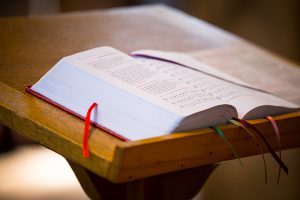 Southern Baptists are once again in the national news. Here are a sampling of headlines from across the nation last week:
Southern Baptists are once again in the national news. Here are a sampling of headlines from across the nation last week:
“Southern Baptists take first step in approving ban on women pastors” — The Tennessean
“Southern Baptists move to purge churches with female pastors” — The New York Times
“Southern Baptists vote to expel two churches led by female pastors” — NBC News
And the list continues to grow.
Sadly, this did not need to be national news.
Southern Baptists made a definitive statement on who is qualified to serve as pastor more than 20 years ago with the Baptist Faith and Message 2000. Article VI of the Baptist Faith and Message 2000 states that “While both men and women are gifted for service in the church, the office of pastor is limited to men as qualified by Scripture.”
That’s about as plain as it gets. Southern Baptists made it clear that the office of pastor is to be filled by men.
Yet, some Southern Baptists felt it needed to be “clarified” even more, so the BF&M 2000 was amended by messengers on June 14 to read, “While both men and women are gifted for service in the church, the office of pastor/elder/overseer is limited to men as qualified by Scripture.”
In addition, messengers approved on first reading a change to the Constitution by adding a sixth item to Article III, section one, to read, “Affirms, appoints, or employs only men as any kind of pastor or elder as qualified by Scripture.” It will need a two-thirds vote at next year’s meeting to be valid. The Executive Committee presented the amendment to the convention for the vote without their endorsement. The committee said it believed the topic was already sufficiently addressed through the Baptist Faith and Message.
I’m not the brightest bulb in the box, but don’t those two amendments basically say the same thing as the original version?
Unfortunately, sometime between 2000 and today, some folks decided it was a good idea to create job titles such as worship pastor, education pastor, youth pastor, etc. It was not a good idea. Some churches use women in those roles and while they may have the title “pastor,” they are not pastors as defined in God’s Word. The issue is not what “pastor” is, the issue is we have diluted the meaning of the word.
In listening to comments at last week’s annual meeting, one would assume the Southern Baptist Convention is inundated with women pastors who fill the pulpit each Sunday, proclaiming God’s Word. That’s simply not the case.
The SBC has approximately 47,000 churches. No one really knows how many churches employ women who have the title of pastor in some role, but I have heard numbers anywhere from 170 to about 2,000. Note that most of these are not senior pastors who preach in the pulpit. There are far fewer of them left. My guess that the number of actual women pastors is in single digits. Why? Because most of them have been dealt with throughout the convention at the associational and state convention levels. That is where it should begin and end.
If the pastor who fills the pulpit each and every week, fulfilling the Scriptural duties of his office is not a woman, then it really is none of our business as to what title the church assigns other staff members. It would be less confusing to use the title of minister in those positions, but that is up to churches. That is local church autonomy.
Actions to strengthen the assignment of the SBC Credentials Committee and the amendments approved this year move the SBC toward a dangerous position of being in a hierarchal position. I don’t think that is what most Southern Baptists want.
As I have heard Randy C. Davis, president and executive director of the Tennessee Baptist Mission Board, say on many occasions, “The headquarters of the Southern Baptist Convention begins at the local church.”
Messenger Bob Bender of Colorado Springs, Colo., summed it up well when speaking against the amendment to the Constitution. “Southern Baptist brothers and sisters, I beg of you,” he said. “Do not do this. All the liberals have left us. It looks like we conservatives are left to fight amongst ourselves.”
We need to spend our time and energy on what matters most — how to take the gospel to people who are lost and dying and going to hell because they do not know Jesus.
Instead of the headlines listed above, wouldn’t it have been great to read this one, “Southern Baptists affirm, ‘No one is going to hell on our watch.’ ”
May God forgive us for misplaced priorities. B&R

